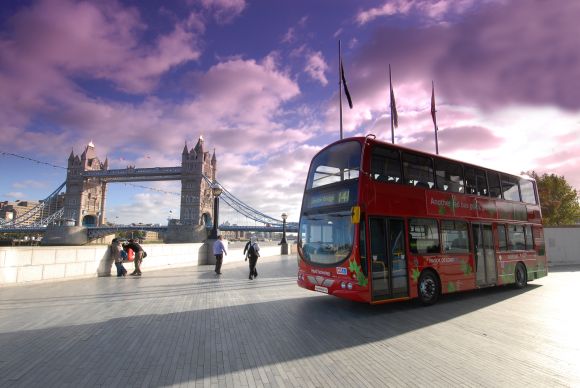
Before sitting down to write this story, I asked a professional bus driver about the average fuel consumption for such a vehicle. As it turns out, a standard Agora bus on the roads of any European city burns about 60 liters of fuel per 100 kilometers, which equates to about 4 mpg. So the claim from British company that it can squeeze 10 mpg Imperial (8 mpg US, 29 l/100km) comes as a very welcome surprise.
This bus was created by Revolve Technologies and supplied to Wrightbus, a company that already has 20 hybrid Gemini 2 HEV buses (traditional double-deckers no less!) servicing London. However, the new model goes a step further and uses a 2.4-liter diesel engine sourced from the Ford Transit to work as a generator and make the ensemble a series hybrid. The engine adapts itself to driving conditions – generating more output when the bus needs more electric power – thanks to advanced electronics that predict load and speed changes in advance. Find the full press release after the jump.
[Source: Revolve Technologies]
PRESS RELEASE:
Revolve optimised hybrid bus breaks new ground for fuel economy and CO2 emissions
A hybrid-electric drive system for buses, for which Revolve Technologies' systems engineering team has developed a specially optimised engine management programme, has achieved the best results for fuel consumption and CO2 emissions ever recorded from a double deck vehicle – an unprecedented 10mpg.
Revolve Technologies, the Essex-based leading engine development and engineering services provider, is supporting Northern Ireland-based Wrightbus on a major hybrid drive performance and optimisation programme, which includes the Gemini 2 HEV double decker. Wrightbus is at the forefront of hybrid electric technology in buses in the UK, with around twenty units already in service in the London area alone.
At the heart of the Wrightbus hybrid system is a standard 2.4 litre Diesel engine – as used in the Ford Transit. With the base engine operating as a generator, Revolve engineers have been able to predict load and speed changes in advance, thus allowing greater freedom with injection strategies and EGR (Exhaust Gas Recirculation) rates.
Drawing on its special knowledge of the engine EMS system, Revolve engineers have also been able to utilise some of the existing vehicle based strategies to carry out functions which otherwise would have required significant software changes. This, coupled with a unique CAN interface module, has allowed the full integration of the engine and its controller into the overall hybrid control system – and at a relatively low cost.
Paul Turner, Revolve's Technical Director of Product Development, said, "Having the engine control as a fully integrated part of the hybrid system is a major advantage – and, coupled with a unique calibration, we have been able to achieve exceptional improvements in fuel consumption. The Wrightbus programme involves optimising Series Hybrid Drive systems through a detailed analysis of generator load patterns. As a result of this analysis, we have been able to recalibrate the engine to operate at its peak performance throughout the drive cycle, by using smart charging and load control technology. Overall engine performance is significantly improved when compared with normal applications."
Revolve Technologies' Executive Chairman, Andrew Williams says, "The Wrightbus hybrid programme gives further insight into the depth, scope and capability which we offer this important and growing area of the market. It is also an excellent working in practice example of the formal technical partnership between Revolve Technologies and Ford Component Sales (FCS) and highlights Revolve's rapidly expanding hybrid and alternative fuels activity. The company is currently involved with projects from small capacity, lightweight units through to heavy commercial, marine and industrial applications."
[Source: Revolve]


Sign in to post
Please sign in to leave a comment.
Continue